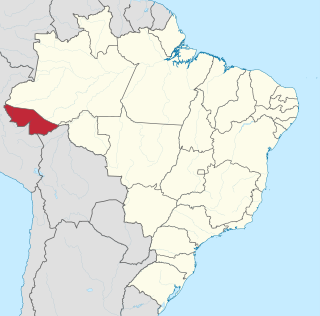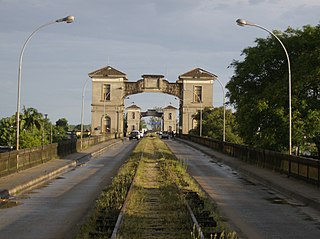See also
| This disambiguation page lists articles associated with the title Branco River. If an internal link led you here, you may wish to change the link to point directly to the intended article. |
Branco River a principal affluent of the Rio Negro in South America.
Branco River (English: White River) may also refer to rivers in Brazil and Bolivia:
| This disambiguation page lists articles associated with the title Branco River. If an internal link led you here, you may wish to change the link to point directly to the intended article. |

The Branco River is the principal affluent of the Rio Negro from the north.

Acre is a state located in the northern region of Brazil. Located in the westernmost part of the country with a two hour time difference from Brasília, Acre is bordered clockwise by the Brazilian states of Amazonas to the north and northeast, Rondônia to the east, the Bolivian department of Pando to the southeast, and the Peruvian regions of Madre de Dios, Ucayali and Loreto to the south and west. It occupies an area of 152,581.4 km2.

Rio Branco is a Brazilian municipality, capital of the state of Acre. Located in the valley of the Acre River in northern Brazil, it is the most populous municipality in the state, with 407,319 inhabitants, according to the 2018 census, almost half the state population. Rio Branco was one of the first settlements to appear in the region, being the 4th oldest state capital city in the North of Brazil. In 1913, it became a county. In 1920, it became the capital of the territory of Acre, and in 1962, the state capital. It is the administrative center for the economic, political and cultural region.

José Maria da Silva Paranhos Jr., Baron of Rio Branco was a Brazilian diplomat, geographer, historian, monarchist, politician and professor, considered to be the "father of Brazilian diplomacy". He was the son of statesman José Maria da Silva Paranhos Sr. The Baron of Rio Branco was a member of the Brazilian Academy of Letters, occupying its 34th chair from 1898 until his death in 1912. As a representative of Brazil, through his diplomacy, he managed to peacefully resolve Brazil's border disputes with its South American neighbours
Branco may refer to:
The Campeonato Capixaba is the football league of the Brazilian state of Espírito Santo.
The Campeonato da Cidade de Campos, also known as Campeonato de Campos, Campeonato Campista and Liga Campista was the football league of the city of Campos dos Goytacazes, Rio de Janeiro, Brazil.
Rio Branco or Río Branco may refer to:

Rio Branco Esporte Clube, usually known simply as Rio Branco or as Rio Branco-SP, is a Brazilian football (soccer) club based in the city of Americana in the São Paulo state of Brazil. It plays in the Série A2, the second division, of the Campeonato Paulista.

Rio Branco Football Club, usually known simply as Rio Branco, is a Brazilian football club based in the city of Rio Branco in the Acre state of Brazil.

Jaguarão is a municipality in the southern Brazilian state of Rio Grande do Sul located on the shores of the Jaguarão River, bordering Uruguay.

Rio Branco Sport Club, usually known simply as Rio Branco, is a Brazilian football club from Paranaguá, Paraná state.

José Maria da Silva Paranhos, the Viscount of Rio Branco was a politician, monarchist, diplomat, teacher and journalist of the Empire of Brazil (1822–1889). Rio Branco was born in Salvador, in what was then the Captaincy of Bahia, to a wealthy family, but most of the fortune was lost after his parents' deaths early in his childhood.

Río Branco is a city in the Cerro Largo department of northeastern Uruguay, on the Brazilian border.

The city of Castelo Branco is a municipality and former bishopric in Castelo Branco District, in Centro Region, Portugal. The name means "white castle" in Portuguese.
Rio Branco is a neighbourhood (bairro) of the city of Porto Alegre, the state capital of Rio Grande do Sul, in Brazil. It was created by Law 2022 from December 7, 1959.

The Negro-Branco moist forests (NT0143) is an ecoregion of tropical moist broadleaf forest to the east of the Andes in southern Venezuela, eastern Colombia and northern Brazil, in the Amazon biome. It lies on the watershed between the Orinoco and Rio Negro basins. It includes both blackwater and whitewater rivers, creating different types of seasonally flooded forest. The vegetation is more typical of the Guiana region than the Amazon.
Miguel Rio Branco is a Brazilian photographer, painter, and filmmaker. His work has focused on Brazil and included photojournalism, and social and political criticism.